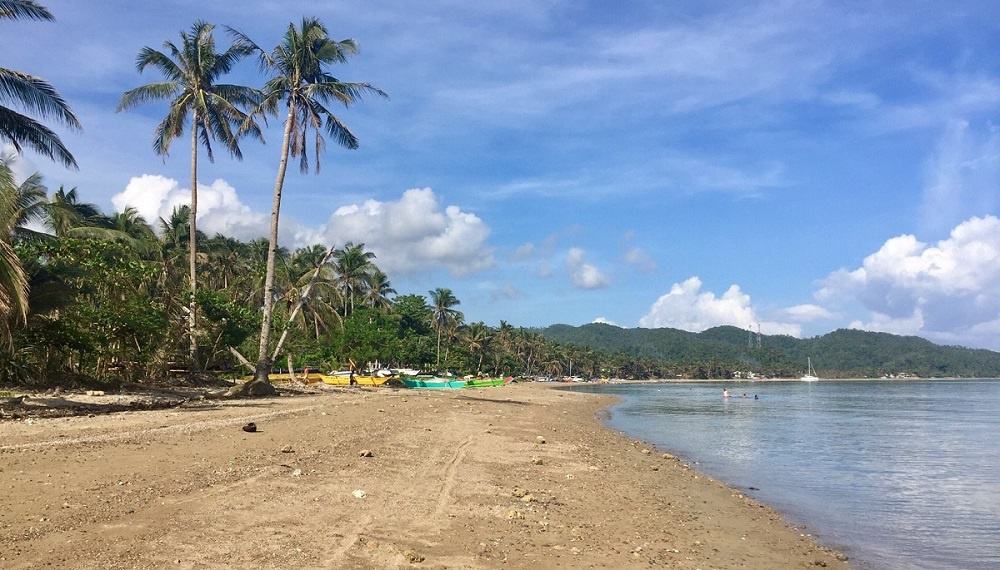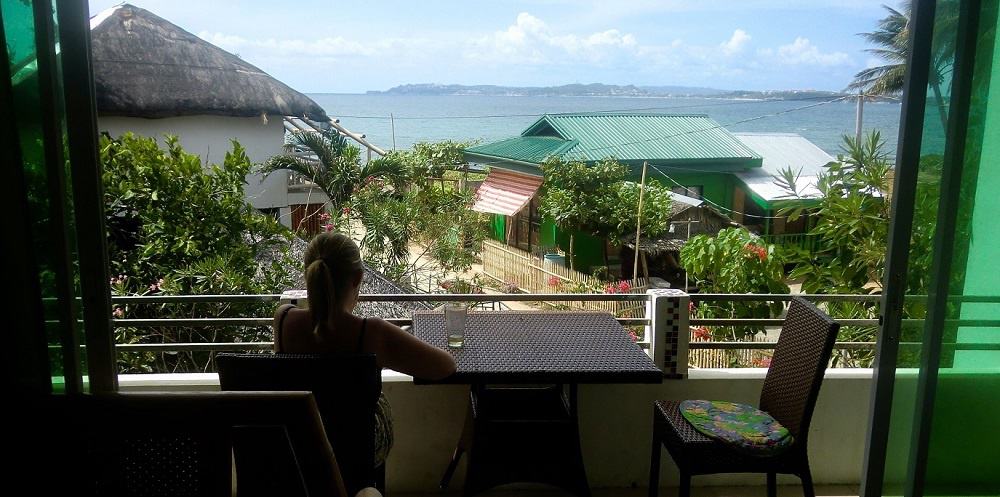Last Updated on June 3, 2023 by Ellen
A couple of miles away from where we stay in the Philippines, a family mourns the loss of a loved one who died of a gunshot wound to the chest. The family is poor. Funeral expenses may as well have been a million dollars.
The tragedy happened in Iloilo – about a six hour drive from Malay, Aklan, where the young man used to live. He worked as a boat tour operator in the local union reliant on Boracay Island tourism. Without tourists and income thanks to the pandemic, he ended up in Iloilo, where he got into a fatal fight.
The deceased man’s brother is on the hook for funeral costs. He works in construction, which is not a high-paying job here, when there is work to be found. We’d never met the family. But people know we help when we can. A mutual acquaintance brought him to our rental apartment. The grieving brother’s plea for financial assistance wrung my heart, as I held the death certificate in my hands.
The funeral cost the equivalent of $700 for a basic arrangement with home viewing that is common in the Philippines. We are on a budget, and we cannot help everyone, much as we’d like to. So though we could not pay for the funeral, we made what we think is a substantial donation.
We don’t often make substantial contributions for people we do not know, because so many people we do know need assistance.
Yet as the pandemic wears on here in this developing nation, we get more requests for ‘help’ from people we do not know.
Some recent examples:
- A woman asked me 4,000 pesos ($80). She said it was for her husband’s medication. I had to say no because it has to stop somewhere. (Her husband will be OK, I hear.)
- Another woman knows we keep a few half-sacks of rice in storage for friends in need, and said she had need. I did not offer her one of the bags – they were accounted for, just not yet delivered to our friends.
- A few neighborhood pre-teen boys ask me for money every time I see them. “Money?” It’s a drag, especially as I’m walking down the street to where I live.
- A two-year-old boy chased me down the beach — and pinched my ass! — to ask, “Money?” No, no money, I said. Who taught you that, I (hardly) wonder.

People are so desperate for income they’ve sold everything they can sell.
They’ve taken micro-finance loans, which are popular here, unfortunately. These are predator loans similar to what’s offered back in the USA. People will never get out from under the debt. But what choice do they have when major life events happen like funerals and there is no work? Shit. These loans are for living expenses– electricity and water and food.
18 months in Malay
If we took all of the money we’ve used to ‘help’ people, we would not have to worry so much about increasing prices of a travel lifestyle. Now there is higher airfare, quarantines and COVID tests, higher Airbnb and food prices.
We could have saved a lot of money living in Malay since the pandemic started. We could have been ready to go skipping off into the sunset to continue our early retired budget travel lifestyle by now.
Well… kinda. My head is kinda in the clouds – hoping we can leave with minimal hassle and expense at the moment. But that won’t happen. Every day, the rules change in many countries because of this damn pandemic.
Theo and I have just been through a round of serious evaluation and discussion about our near-future plans. How can anyone plan a travel lifestyle – on a budget – in these times? I know early retired people with more money than us. They are traveling. And I know early retired people with less money than us. Many have stopped their travel lifestyles.
The biggest difference between travel and slow travel, and living somewhere abroad longer term is the depth of connection with community.
No one knows too much about you when you’re breezing through places. In casual travel, no one is coming to your rental apartment to ask for money for a family funeral, or your brother’s hospital bill, or your aunt’s eye surgery, or your trike payments, or your leaky roof repair, or a little rice to ease growling stomachs of children.
In slow travel, you make acquaintance, and then you’re off to the next adventure. You know you won’t be there forever and you feel free, while still able to explore more in-depth than if you’d simply blown through town for a week.
Our current ‘no travel’ situation feels like … well, sometimes, I feel shackled. Trapped. I feel like we will be here forever.
As I write this, it is exactly 18 months — 1.5 years — that we have been in Motag. (We’ve been in the Philippines even longer – since November 2019.) And more often than not, when ‘help’ is needed, we try to give it. But our budget is not limitless, and I’m concerned about the outflow.

Ironically, on this same day I write this, September 16, tourists from the National Capital Region (NCR) officially are allowed back to Boracay following the latest lockdowns from Delta surges.
Cases are increasing around Manila, but tourists from there will be welcomed back to the island here because the income situation is desperate. Hunger has increased, suicides continue, small business owners don’t see how they can keep going. (A friend on Boracay sent me a YouTube video that shows what the pandemic looks like in ‘paradise’ away from the famous White Beach.)
There is no choice but to open up. The economic engine of this region must start again. People cannot survive like this much longer. I don’t know how they’ve survived this long. I don’t know how I’ve survived this long.
Spiritual quest
We have always said “we are here for a reason” and we have done many amazing projects for people here – especially the indigenous Ati tribe. There are so many other things we do that we never write about – other ways we help.
And while it feels good to help, sometimes being here gets me down. Stuck in Motag is simply not how I want to spend my life. Life is NOW, damn it. And I want to see India, Egypt, Israel, Turkey, Germany, and… on and on.
It blows my mind we’ve lived in Motag, Malay, for a year and a half. Mom Diane left almost a year ago (October 2020).
I miss her wisdom, her unshakable faith in God. I keep working to deepen my faith. Goals. I know I have to pray and meditate more. It’s not easy.
I randomly opened my spiritual handbook recently to the following passage, which is of great comfort to me:
“Those of us who have spent much time in the world of spiritual make believe have eventually seen the childishness of it. This dream world has been replaced by a great sense of purpose, accompanied by a growing consciousness of the power of God in our lives.
We have come to believe God would like us to keep our heads in the clouds with Him, but that our feet ought to be firmly planted on Earth. That is where our fellow travelers are, and that is where our work must be done…”
There is a saying my fellow spiritual seekers use. “God’s time, not mine.” Indeed.
Until the world opens up, I’ll keep my head in the clouds as I trudge the Road to Happy Destiny on Earth.


Hugs ❤️ Although life away looks like paradise and you’re helping people, there can be a toll on mental health after some time.
Thank you for sharing so much of your reality!
I love you Ellen! xxxooo